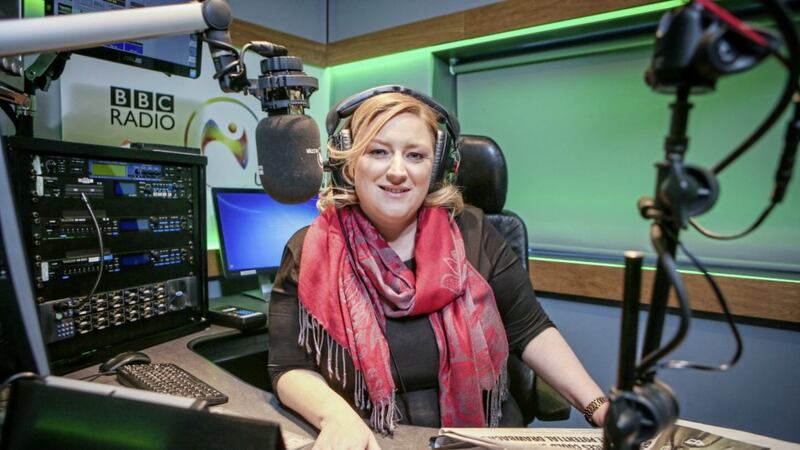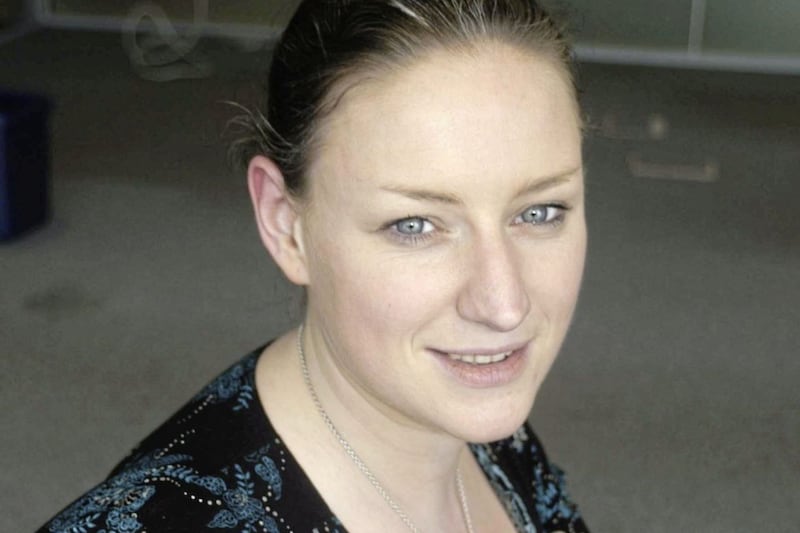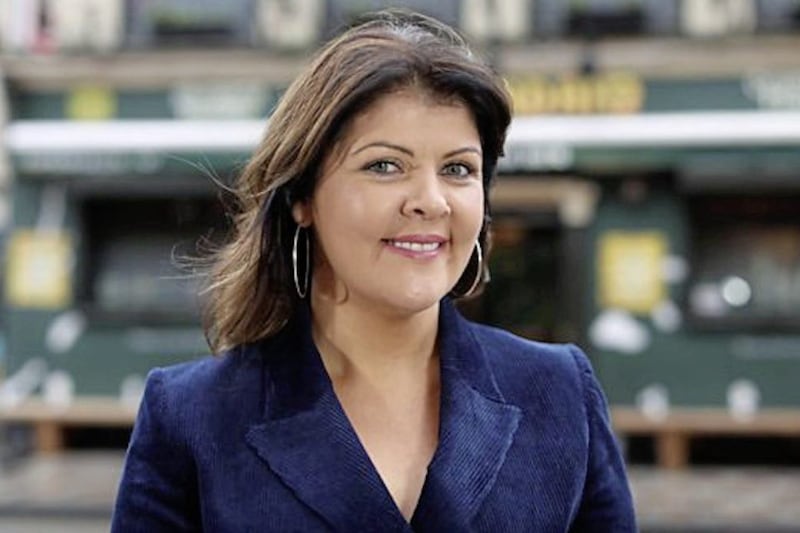AWARD-winning journalist, author and broadcaster, Newry-born Dearbhail McDonald, is excitedly contemplating the jingle to her new Sunday radio show and relishing the mood-stealing violins – the “most comforting sound I know”.
While an overflowing CV includes everything from rookie reporting on a women’s football match in the Bronx for Irish diaspora newspaper Home and Away, to covering the big show trials of the financial crisis (as legal editor of the Irish Independent), and, latterly, guiding the Brexit debate as business editor of the entire Independent News and Media group, this is her first radio show – and mood music is important.
Hosting BBC Radio Ulster’s Sunday with Dearbhail (now approaching its third week) she likens to an exhilarating “big, loud family debate” around her own kitchen table, and, as an enthusiastic musician – who once enjoyed a short-lived career as a Belfast busker – she believes radio jingles set the tone.
“Radio has been such an adrenaline rush,” gushes the personable Trinity College graduate (Law) and author of Bust: How The Courts Have Exposed The Rotten Heart Of The Irish Economy when we meet up at Belfast’s Grand Central Hotel – just a stone’s throw from her new BBC HQ in Ormeau Avenue.
“Eventually, we went with one that had violins because it is the most comforting sound I know. I spent three days walking the cliffs in Howth, where I now live, listening to a 21-second piece of music to get myself into the groove...”
That said, the former South Ulster Youth Orchestra instrumentalist has always secretly preferred the deep, rich tones of the cello and is currently taking lessons on a “bonkers” bright blue one, bought for her by twin sister, Aoife, as a surprise 40th birthday gift two years ago.
It is a “private indulgence” for the high-flying media figure, Eisenhower Fellow and recipient of the Mary Cummins Award for Women of Outstanding Achievement in Media who earlier this year left her business editor post and opted to go solo – in more ways than one.
The 42-year-old had her eggs frozen for potential future motherhood as an “insurance policy” (one she may never cash in) when still in her 30s and also because a number of friends who had been treated for cancer had their own choice abruptly snatched away. She went public with her story in a revealing documentary she wrote, presented and co-produced for RTÉ earlier this year on the economic impact of declining fertility rates on developing countries, including Ireland.
Having eggs harvested, removed and frozen proved a painful, emotionally fraught journey, as well as a costly one in cold, financial terms, but in the “tough moments”, after being “poked and prodded” by medical staff at a London clinic – oh, how she needed to hear those violins! – McDonald would nip across the road and find solace in St Paul’s Cathedral.
“St Paul’s was my sanctuary at the time,” she says simply. “The clinic was quite near St Paul’s and it was a beautiful, majestic place to go. It was peaceful.”
Friends and her four sisters also rallied and set up a unique kind of support group entitled ‘Operation Frozen’ – characterised by two emojis, one depicting a chick popping out of an egg and another of a snowflake.
“There were many funny moments,” McDonald recalls in a warm Newry accent which, along with her sense of humour, has remained refreshingly intact, despite recently immersing herself in the French language following her appointment as chair of the strategy committee of the Centre Culturel Irlandais in Paris.
“There were sad moments as well, but I never once regretted my decision, even though I never meant to go public with it. I do think you can take steps toward your destiny, but like many things in life, it happened almost accidentally.”
In fact, it was a revelation that might never have happened only for her twin, Aoife – “aka The Boss” at eight minutes older – sitting in the audience of an Institute of Directors meeting at which McDonald was giving an address on declining birth rates and the ‘baby bust’ – ‘Why the Bedroom Matters in the Boardroom’ – and giving her a coded thumbs-up.
“I had two different scripts for the end of that address in the National Concert Hall in Dublin,” muses the journalist, who has always sought to be “an unrepentant advocate for equality”.
“I didn’t know until the last moment which one I would go with. But, I looked up and saw Aoife’s eyes were filled with pools of tears. She gave me the nod… and I revealed the personal side of the story.”
The reaction was swift and in some ways startling for the then business editor who was not used to being the centre of the story herself. However, she says sharing her story as part of a wider fertility debate has led to her helping eight other women embark on the same ‘frozen’ journey.
“Hoards of women, some of whom I knew, and most of whom I didn’t, came to my door, afterwards,” she says. “When you’re open about something like that, I think it gives permission for others to speak to you. There were also many men whose interest was piqued because one of the big things in the documentary was how the quality of men’s sperm counts has collapsed.
“I found having my eggs frozen a very empowering thing in the end and I believe that in the next generation, when kids leave school, maybe instead of putting down a deposit on a house, they will freeze their DNA – not for deferring parenthood, but because that is the time when their DNA is at its very best.”
Meanwhile, Brexit has brought her home in more ways than she could have imagined and she recounts another surreal incident when the professional and personal unexpectedly collided.
“I remember the night of the Brexit vote, seeing the first votes coming in, watching the drama unfold, looking at the markets and the pound falling – and all that was going through my mind was, forget Brexit, this is Eggsit – my eggs,” she recounts, laughing.
“My eggs were over in London and had left the European Union! It was a funny moment because everyone else in the newsroom was in shock over sterling.”
In terms of the ‘constitutional question’, Brexit, in McDonald’s view has “accelerated a debate that we thought was maybe 10, 15 or 20 years away”.
“I think it had been hoped by many that things would sort of move organically”, she says, though that was thought to be something that was “another generation away”.
She concurs with DUP leader Arlene Foster’s pronouncement at the party’s recent annual conference that “this is going to be the most unpredictable election of
all time”.
Drama, whether in real life or on stage – a promising career in theatre once beckoned after she was “virtually reared” by the Newpoint Players in Newry – seems always to have played a leading role, but now, after working 60-to-70-hour weeks, McDonald is determined to set her own pace.
She still writes for The Guardian newspaper and has embarked on two new books – one a ‘noir’ fiction after joining a creative writing group in Howth. Lately, the “new thing” is cold water sea swimming – sans wetsuit, of course.
“I got exhausted and when I took shingles last year, which I think was more pace-related than stress related, my best friend, who lives by the coast, told me to get in the sea,” she says. “The first time, it was so cold I nearly ran out, but then an 81-year-old man, just out of surgery, said to me: ‘Would you just get on in…'
“I did. I took the plunge and didn’t look back. I think I’ve found my tribe.”
:: Sunday with Dearbhail, BBC Radio Ulster, Sunday 11-1pm.





